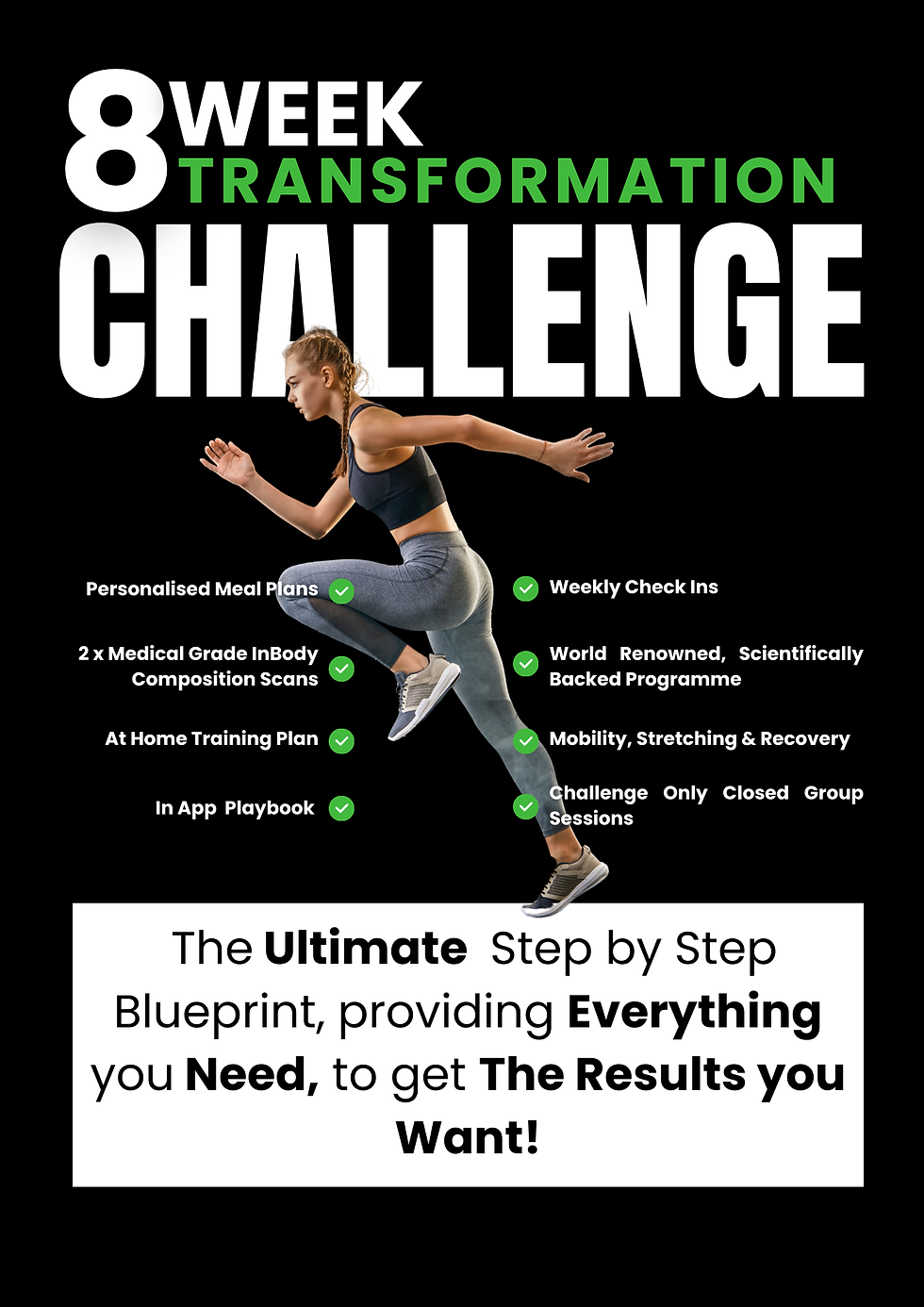Nutrition Rules to Maximise Your Results in an 8 Week Challenge
- The Fitness Vault
- Aug 26
- 3 min read
An 8 week challenge can be a powerful reset for your training, health, and lifestyle. But while the workouts build strength and fitness, it’s often nutrition that makes or breaks results.
The good news? You don’t need to follow extreme diets or starve yourself to see progress. In fact, research shows that overly restrictive eating can backfire, leading to energy crashes, poor recovery, and unsustainable results.
Instead, the key to making the most of an 8 week challenge is learning how to fuel your body properly. Below are simple, science backed nutrition rules to help you perform well in training, recover faster, and see results you can maintain long after the challenge ends.

1. Match Your Food to Your Training Goals
Before adjusting your diet, get clear on your main focus for the 8 week challenge:
Fat loss: Slight calorie deficit, prioritising protein and whole foods
Muscle gain: Small calorie surplus, with higher protein and carbs
Performance and energy: Balanced approach, focusing on nutrient timing
The key is sustainability. Aim for gradual, measurable progress rather than chasing drastic changes.
2. Prioritise Protein at Every Meal
Protein is essential for muscle repair, recovery, and satiety. It also supports lean muscle mass, which helps improve body composition during an 8 week challenge.
Science-backed target: Aim for 1.6 - 2.2 grams of protein per kilogram of bodyweight daily.
Smart protein sources:
Chicken, turkey, lean beef
Eggs and low-fat dairy (Greek yoghurt, cottage cheese)
Fish and seafood
Tofu, tempeh, legumes for plant-based options
Try to spread protein intake evenly across meals to maximise absorption.
3. Fuel Your Training With Smart Carbs
Carbohydrates are your body’s main source of energy during high-intensity training. Cutting them too low can lead to fatigue, poor performance, and reduced recovery.
Best approach:
Choose complex carbs (oats, brown rice, sweet potato, wholegrains) for steady energy.
Time simple carbs (fruit, white rice, honey) around training for quick fuel or recovery.
Balancing carbs ensures you can push hard in every workout across the 8 week challenge without hitting a wall.
4. Include Healthy Fats for Hormone and Joint Health
Fats aren’t the enemy. In fact, they are vital for hormone production, joint health, and overall energy balance.
Focus on:
Avocado
Olive oil
Nuts and seeds
Fatty fish like salmon or sardines
Aim for moderate portions and try to limit heavily processed oils or fried foods.
5. Hydration Matters More Than You Think
Even mild dehydration can impact performance and recovery. During an 8 week challenge, where training intensity is higher, water and electrolytes become essential.
Hydration rules:
2–3 litres of water daily
Add electrolytes if sweating heavily or training in heat
Monitor hydration by checking urine colour (light yellow is ideal)
6. Don’t Fall Into the “All or Nothing” Trap
One of the biggest mistakes people make during an 8 week challenge is going too hard, too fast with their nutrition. Overly restrictive diets often lead to burnout and binge eating.
A more effective approach is 80/20 balance:
80 percent of your food from whole, nutrient dense sources
20 percent flexibility for social events, favourite foods, or treats
This balance makes the plan enjoyable and sustainable.
7. Plan and Prepare Ahead
Meal prep doesn’t mean eating bland chicken and rice every day. It simply means having healthy, ready-to-go options so you’re not stuck making poor choices when you’re busy.
Some easy prep strategies:
Batch cook proteins (grilled chicken, boiled eggs, salmon fillets)
Chop vegetables in advance
Pre-portion snacks like nuts or yoghurt cups
Planning removes decision fatigue and keeps you consistent.
✅ Final Word: Build Habits You Can Keep
The true success of an 8 week challenge isn’t just in the results you see at the end—it’s in the habits you build along the way.
By focusing on protein, smart carbs, healthy fats, hydration, and balance, you’ll fuel your body in a way that supports both performance and long-term health. Forget extreme diets. Nutrition should make you feel stronger, not weaker.
📍 Want structured training and nutrition support? Learn more about The Fitness Vault’s Sell out 8 Week Challenge programme here: thefitnessvault.com.au/8-week-challenge
FAQs: Nutrition for an 8 Week Challenge
Q: Do I need to track calories? Not always. It helps some people, but focusing on portion control and food quality works well too.
Q: Should I cut out carbs to lose fat? No. Carbs are important for energy and performance. Balance and timing are key.
Q: Can I still enjoy treats during the challenge? Yes. Following an 80/20 approach makes your plan sustainable long term.
Q: How do I avoid overeating when hungry after training?
Prioritise protein and fibre-rich foods, which keep you full longer.





Comments